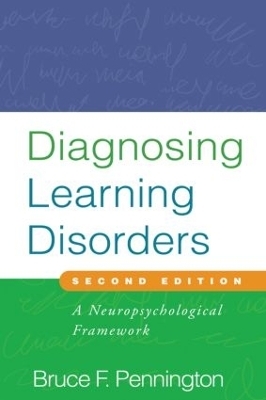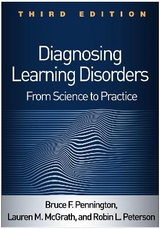
Diagnosing Learning Disorders, Second Edition
Guilford Publications (Verlag)
978-1-59385-714-1 (ISBN)
- Titel erscheint in neuer Auflage
- Artikel merken
From a trusted expert in the field, this authoritative work provides an accessible overview of what learning disorders are, how they develop, and how to diagnose and treat them effectively. The author presents the most current neuroscientific knowledge on a range of conditions, including dyslexia, autism spectrum disorders, attention-deficit/hyperactivity disorder, and others. Practitioners gain vital insights and tools for making sense of children's impairments and strengths, collecting and interpreting diagnostic data from a variety of sources, and linking diagnosis to evidence-based interventions. The second edition has been substantially revised and expanded to reflect significant clinical and research advances.
New to This Edition
*Covers additional disorders: intellectual disability, mathematics disorder, and developmental coordination disorder, plus a chapter on less well-validated disorders.
*New case illustrations and a focus on empirically based practice.
*Now grounded in a multiple cognitive-deficit model of learning disorders, replacing the prior edition's modular, single-deficit model.
*An illuminating chapter on controversial therapies separates myths from facts.
Bruce F. Pennington, PhD, is a developmental neuropsychologist who has earned an international reputation for his research on dyslexia, attention-deficit/hyperactivity disorder, and autism. He has published 163 articles in refereed journals and was selected to appear on ISIHighlyCited.com because of his exceptional citation count in the field of Psychology/Psychiatry. He is particularly interested in using genetic and neuropsychological methods to understand comorbidity among disorders. Dr. Pennington is a John Evans Professor of Psychology at the University of Denver, where he heads the Developmental Cognitive Neuroscience Program. His honors include Research Scientist, MERIT, and Fogarty awards from the National Institutes of Health; the Samuel T. Orton Award from the International Dyslexia Association; and the Emanuel Miller Memorial Lecture from the British Association for Child and Adolescent Mental Health. He is also a Fellow of the American Association for the Advancement of Science. In addition to being a researcher and research mentor, Dr. Pennington is also a child clinical neuropsychologist, and has been active in clinical practice and training throughout his career.
I. Basic Concepts
1. How Learning Disorders Develop
2. Neuropsychological Constructs
3. Issues in Syndrome Validation
4. Less Well-Validated Learning Disorders
5. Differential Diagnosis
II. Reviews of Disorders
6. Dyslexia, with Robin L. Peterson and Lauren M. McGrath
7. Speech and Language Disorders, with Robin L. Peterson and Lauren M. McGrath
8. Autism Spectrum Disorder, with Lauren M. McGrath and Robin L. Peterson
9. Attention-Deficit/Hyperactivity Disorder, with Lauren M. McGrath and Robin L. Peterson
10. Intellectual Disability, with Lauren M. McGrath and Robin L. Peterson
11. Developmental Coordination Disorder
12. Mathematics Disorder
13. Nonverbal Learning Disability
III. Implications for Practice and Policy
14. Evidence-Based Practice: Barriers and Benefits
15. Controversial Therapies
Appendix A. Helpful Resources for Parents and Teachers
Appendix B. Useful Websites
Appendix C. Frequently Used Tests for Learning Disorders
| Erscheint lt. Verlag | 24.11.2008 |
|---|---|
| Verlagsort | New York |
| Sprache | englisch |
| Maße | 152 x 229 mm |
| Gewicht | 628 g |
| Themenwelt | Geisteswissenschaften ► Psychologie ► Biopsychologie / Neurowissenschaften |
| ISBN-10 | 1-59385-714-4 / 1593857144 |
| ISBN-13 | 978-1-59385-714-1 / 9781593857141 |
| Zustand | Neuware |
| Haben Sie eine Frage zum Produkt? |
aus dem Bereich



